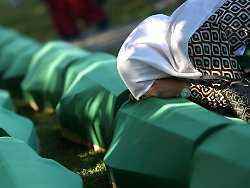Massacre in the Balkan War
Netherlands apologize for failure in Srebrenica
7/11/2022 2:54 p.m
Around 8,000 people fell victim to Serbian units in and around Srebrenica in 1995 – in one of the worst war crimes since World War II. The Netherlands, which had blue helmets stationed in the region at the time, are now apologizing to the victims.
27 years after the Srebrenica genocide, the Netherlands has for the first time apologized to the families of the victims for their failure. “The international community failed to protect the people of Srebrenica,” Defense Minister Kasja Ollongren said at the memorial service in Potocari, Bosnia-Herzegovina. “As part of this community, the Dutch government also bears some of the political responsibility for the situation in which this failure could have happened. We deeply apologize for that.”
Srebrenica was a UN protection zone during the Balkan War. The Dutch UN unit Dutchbat was supposed to protect thousands of Bosnian refugees in the enclave in the summer of 1995. But on July 11, Serbian units led by General Ratko Mladic overran Srebrenica. The lightly armed blue helmets did not resist. The Serbs then murdered around 8,000 Bosnian Muslim boys and men. The mass murder was previously considered the worst war crime in Europe after the Second World War.
The government has previously admitted its own political mistakes, but has always refused a clear apology. “We cannot take the suffering away from you,” said the defense minister. “But what we can do is face that story head-on.” Ollongren also stressed that the Bosnian Serb leaders were to blame for the genocide. The UN war crimes tribunal in The Hague had sentenced the Serb leader Radovan Karadzic and ex-General Mladic to life imprisonment.
The EU foreign policy chief Josep Borrell, the high representative Christian Schmidt and the vice-president of the Bundestag Aydan Özoguz also took part in the commemoration. Another 50 victims were buried during the celebration. 6,652 victims are now buried in Potocari, 237 were buried elsewhere at the request of the families, and more than 1,000 are considered missing.
